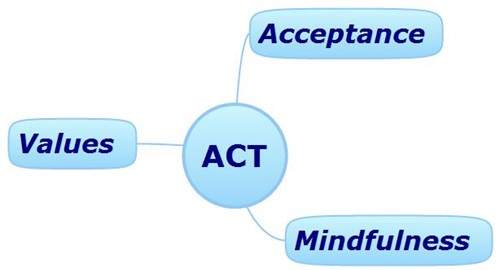Health Psychology health is the interplay between medical illnesses and mental health symptoms, including depression, anxiety, stress, and poor adjustment. Treatments focus on assisting patients prevent, manage, and cope with medical diagnoses.
Dr. Trevor Taylor, McKenzie Dearing, LCSW, and Jaci Faulkner, CSW primarily use Cognitive Behavioral Therapy (CBT) and Acceptance and Commitment Therapy (ACT) to treat the link between medical and mental health symptoms. Below is a brief description of those therapies.
Cognitive Behavioral Therapy (CBT) is a psychotherapy intervention that involves focus on thoughts, feelings, and behaviors. This modality focuses on changing the automatic negative thoughts that can contribute to and worsen emotional difficulties, depression, and anxiety. Through CBT, these thoughts are identified, challenged, and replaced with more objective, realistic thoughts. Cognitive Behavioral Therapy can be utilized in many chronic medical conditions, including:

Acceptance and Commitment Therapy (ACT): ACT it is a type of therapy that aims to help patients accept what is out of their control, and commit to actions that enrichen their lives based around one’s values. ACT uses acceptance and mindfulness strategies, together with commitment and behavior change strategies, to increase psychological flexibility.

When you scheduled your first appointment, you were asked to complete an intake packet that is used by clinicians to quickly gain information about your mental health, medical, developmental, educational/occupational, and legal histories. The intake packet is used to help the clinician know what topics may need to be discussed during your first appointment. Please remember to complete your intake packet, which can be found on Dr. Trevor Taylor’s page.
The first appointment generally lasts 40 to 50 minutes and is often called an intake interview. The time is utilized to explore and discuss the reason you made the appointment and to explore potential mental health symptoms. Through this process, your clinician will be able to provide you treatment recommendations to assist you in meeting your goals, while also determining if you are a good fit for the type of services we provide.
Your clinician may recommended a variety of treatment options, including individual therapy, a psychological evaluation, medication management, and referrals to other mental health experts.
The Health Psychology department offers psychological evaluations and assessments for a variety of mental health diagnoses. You can learn more about these evaluations and if they may benefit you by clicking on the link.
Our Health Psychology specialists offer BEHAVIORAL HEALTH CRASH COURSES on the link between mental health and chronic illnesses. Check out the page to learn more information, what topics are offered and when, as well as how to sign up!
Classes are offered by Dr. Trevor Taylor, Clinical Psychologist, and McKenzie Dearing, Clinical Social Worker.
